Ian Thorpe, Dawn Fraser and Shane Gould Among First Inductees Into Swimming Australia Hall Of Fame
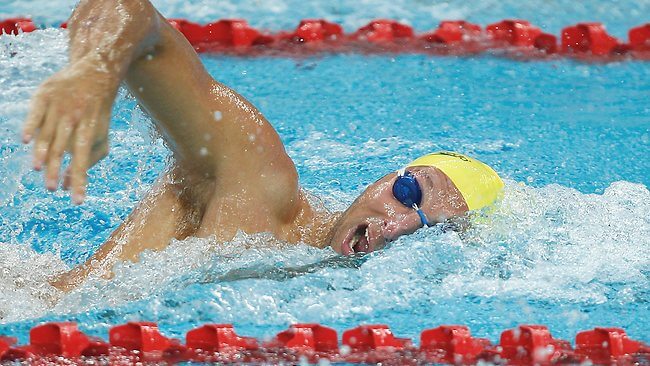
Ian Thorpe, Dawn Fraser and Shane Gould Among First Inductees Into Swimming Australia Hall Of Fame
Ian Thorpe, Dawn Fraser and Shane Gould have been joined by two pioneer Olympic gold medallists in Freddie Lane and Sarah “Fanny” Durack as the first inductees into the Swimming Australia Hall Of Fame.
The inaugural inductees were unveiled tonight at a glittering Awards Ceremony in Sydney with the two attendees Fraser and Gould both given a rousing reception.
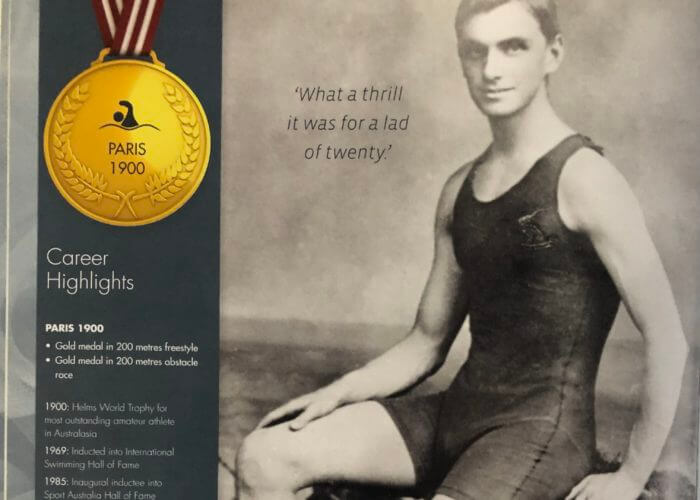
Freddie Lane: Photo Courtesy: Olympic Gold.
Lane, a Sydney lifesaver, was Australia’s first Olympic champion at he 1900 Olympic Games in Paris where swimming events were conducted in the muddy waters of the River Seine and set the scene for the legendary performances of Australia’s first Olympic golden boy.
Lane was the “the Thorpie” of his day – holding almost all of the fastest times recorded and in 1899 he won the coveted 220 yards and 440 yards British titles and later dead-heated with the great Roy Derbyshire over 220 yards.
But at the Olympics, Lane, who was also an accomplished surf lifesaver at the Mona Vale Surf life Saving Club on Sydney’s Northern Beaches, was right at home in the currents of the Seine.
Zoltan Halmay from Hungary was regarded as one of the men to beat and he went out hard but by the 100 yard mark, Lane had caught him and the pair swam stroke for stroke until the final 25 yards when the tough little Aussie powered home to win by over six seconds.
His time of 2 mins 25.2 secs was some 13 seconds faster than his own world record but because of the currents was not recorded as a world best.
Later in the day Lane then added his second Olympic title (there were no gold medals in Paris – just trophies) in the 220 yard Obstacle race which required competitors to swim to and climb over a pole; swim to and climb over a boat; swim to a punt and dive under it.
No problem for the swimming surf lifesaver from Sydney – but in their wisdom Olympic officials put the Obstacle Race on the backburner for all future competitions.
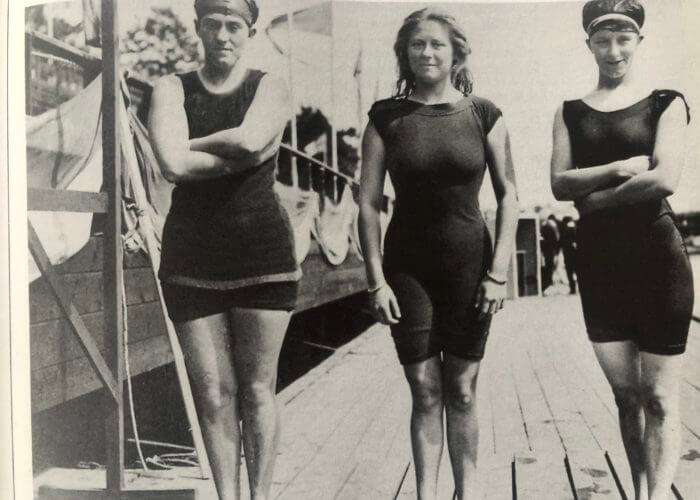
Mina Wylie, Fanny Durack and Jennie Fletcher – Stockholm 1912. Photo Courtesy: Swimming NSW
Lane went on to become the first man to clock 60 seconds for 100 yards when he won the British Championship in Manchester in 1902 – beating Derbyshire and Australia’s own Dick Cavill.
The little master of the pool, who put so much back into the sport in NSW with his old mate Charlie Bell from Manly, died in 1969 at Collaroy, aged 89.
TWELVE years after the feats of Lane and it was time for the Aussie girls to take the Olympic swimming pool by storm for the first time – although they had their battles.
The names Sarah “Fanny” Durack and Wilhelmina “Mina” Wylie are synonymous with putting the women of Australia on the international Swimming map.
Not an easy task in a male dominated world and a male dominated sport in an era when women were not allowed to bare their bodies (covered neck to knee swimsuits).
But Durack holds a celebrated place in the annals of Olympic sport as not only the first Australian but the first woman to win an Olympic swimming gold medal.
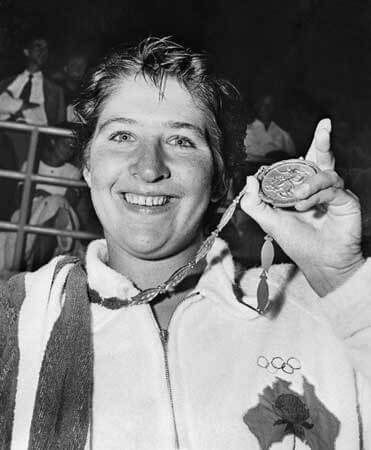
Dawn Fraser with the 100m gold, 1960 – Photo Courtesy: The Dawn Fraser Collection
The Stockholm Games of 1912 conducted in an open air pool especially constructed in the city’s Harbour pool and Durack and Wylie actually won gold and silver in the 100m freestyle in 1:22.2 – 3.2 seconds faster than Wylie, who’s famous father Harry taught Durack to swim at the Coogee pool that went on to become Wylie’s Baths.
Durack won her first titles as a breaststroker and then perfected the various techniques and styles into trudgen (a combination of breaststroke leg action with alternate arm strokes with alternate arm strokes over the water) moving on to the Australian Crawl.
She went on to win the Australasian 110 and 220 yard titles but the NSW Ladies Amateur Swimming Association had a ban on women swimming in front of men.
Even fathers were not allowed to watch their daughters swim.
The pair had to battle officialdom to get not just one but two swimmers on the Olympic team and also to fund their trips to Stockholm.
Thank goodness sanity prevailed and both Durack and Wylie were given the opportunities to display their amazing swimming prowess.
Durack’s 1920 Olympic campaign came to an end before it started after she was struck down by appendicitis, typhoid fever and a subsequent bout of pneumonia – ending her amazing career.
Dawn Fraser is the third inductee – the girl who grew up on the streets of Balmain and learned o to swim in the waters of the near-by ocean baths that she would make her own.
A pool that would become known as the Dawn Fraser Baths and whose extraordinary feats would see her voted as the Swimmer of the Century – after winning three successive Olympic 100m freestyle gold medals in 1956, 1960 and 1964, re-writing the world record books along the way, throughout a dominant career.
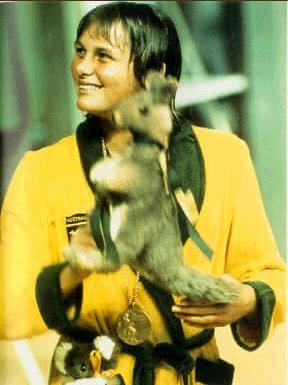
Shane Gould 1972 Munich – Photo Courtesy: Ruass McPhedran (Ian Hanson Collection)
Dawn remains the inspiration of a nation of swimmers who have continued Australia’s international success and standing as a major swimming nation – an icon of Australian sport.
The fourth inductee is Shane Gould – a triple gold medallist from the 1972 Munich Olympics at the age of 15 who left the sport as quickly as she made it. The winner of five individual Olympic medals, three gold medals in the 200 and 400m freestyle and 200IM, all in world record times, plus one silver in the 800m freestyle and one bronze medal in the 100m freestyle.
From 1971 to 1973 Gould broke 11 world records in six different events. In 1972 she held all Freestyle World Records from 100m, 200m, 400m, 800m, 1500m and 200m IM which to date, is unmatched.
Ian Thorpe in the fifth and final inductee for 2022, the boy who was crowned World Champion at 15, Olympic champion at 17 and again at 21.
The winner of five Olympic gold medals in the pool – the most by any Australian male athlete; three gold in Sydney 2000; the 400m freestyle and the 4×100 and 4 x200m freestyle relays and two gold in Athens in the 200 and 400m freestyle – the 400m freestyle after he was disqualified for breaking at the Olympic Trials meet only to have team mate Craig Stevens relinquish his place and for Thorpe to snatch gold from team mate Grant Hackett and to defend his title. The winner of 11 gold medals at three World Championships in 1998, 2001 and 2003. Rewrote the world records for 200 and 400m freestyle between 1999 and 2004, setting 23 world records.
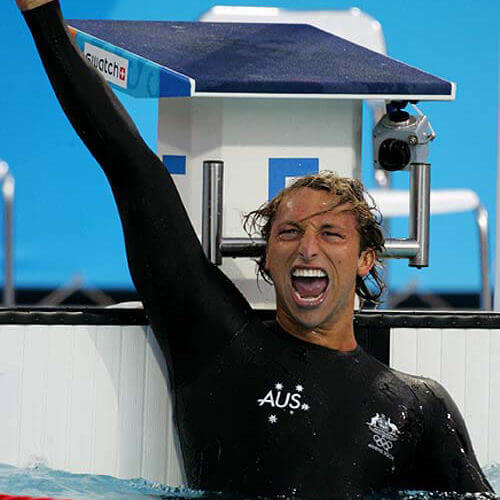
ATHENS GOLD for Ian Thorpe. Photo Courtesy: Delly Carr.




Don’t forget Forbes Carlisle and Harry Gallegher.
What about Murray Rose?